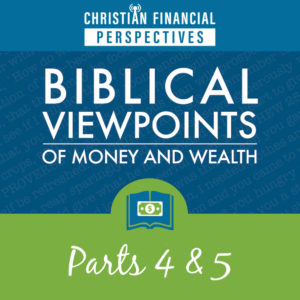Click below to listen to Episode 32 – Biblical Viewpoints of Money and Wealth Parts 4 and 5
Subscribe: Apple Podcasts | Google Podcasts | Spotify | Amazon Music | Stitcher | RSS | More
Biblical Viewpoints of Money and Wealth Parts 4 and 5
In this week’s show, Bob and Mary Jo continue along in the “Biblical Viewpoints of Money and Wealth” series. It was originally designed as a Bible Study written by Christian Financial Perspectives host, Bob Barber.
In this episode, Viewpoints 4 and 5 are covered, which include:
- Secular and Biblical Counsel
- Money and Wealth
The series is a deep dive into what God’s word has to say about money, so we thought this would be a perfect topic to cover here on Christian Financial Perspectives.
HOSTED BY: Bob Barber, CWS® and Mary Jo Lyons, CFP®
Mentioned In This Episode
Want to ask a question about your specific situation? Schedule a complimentary 15 minute phone call.
EPISODE TRANSCRIPT
[INTRODUCTION]
Bob: Welcome to Christian Financial Perspectives, a weekly podcast where we talk about ways to integrate your faith with your finances. This is Bob Barber.
Mary Jo: And I’m Mary Jo Lyons.
Bob: Are you ready to learn how to apply biblical wisdom to everyday financial decisions?
Mary Jo: Join us as we look at integrating your faith with your finances. If it’s your first time listening, welcome to our podcast, and if you’re a returning listener, welcome back.
[EPISODE]
Mary Jo:
In this week’s show, we will continue along in our series called “Biblical Viewpoints of Money and Wealth”. This was originally designed as a Bible study and written by my co-host, Bob Barber. The series is a deep dive into what God’s word has to say about money. We thought it would be the perfect topic to cover here on Christian Financial Perspectives. If you’d like to get a copy of the Bible study, the Bible study guide, called “Biblical Viewpoints of Money and Wealth”, you can go to Amazon to order it. This series includes seven viewpoints. Bob, let’s review the first three viewpoints that we covered in our earlier sessions. The first of which serves as the foundation for the series.
Bob:
Viewpoint number one is the difference between a biblical and secular worldview, which truly this is the foundation for the entire Bible study that I wrote on handling wealth from a biblical perspective. Without that foundation, it’s hard to take in all the other viewpoints because it all builds on that. And then viewpoint number two is the difference between the roles of the owner, which is God, and the manager, which is us, and how our role is to be good stewards of the resources God has entrusted to us. Viewpoint number three is the biblical worldview of working and retirement. Most people don’t realize that the Bible has over 550 scriptures when it talks about working, but only one, and I mean just one scripture, in the entire Bible that speaks of retirement. And it’s not at all in the way we think of retirement here in America, but it has to do with mentoring those in the workforce that are younger than us.
Mary Jo:
It’s just amazing. It’s just one time and work is referred to so many times. I just think the contrast is unreal. And if you missed the first of these two podcasts, you can easily listen to them christianfinancialpodcast.com. Today, we’re going to cover biblical viewpoints of secular and biblical counsel and money and wealth. And for our last podcast next week, we will cover the last two biblical viewpoints of money and wealth, and that is giving and blessings, inheritance, and legacy.
Bob:
Before we get into today’s viewpoints, there are some overarching principles for the entire Bible study. The first one is, is that all financial decisions are spiritual decisions.
Mary Jo:
Our self worth should not be associated with our net worth.
Bob:
We are managers, not owners.
Mary Jo:
We are to manage it to glorify the owner.
Bob:
We are a conduit of wealth. It is for flowing through us, not to stay in us.
Mary Jo:
Wealth does not belong to us, but to God.
Bob:
For today’s podcast, we’re going to cover viewpoint number four and five. Number four is advice and virtues, secular and biblical counsel. A great scripture that goes with this is one you’ve heard us talk about many times on Christian Financial Perspectives, Proverbs 15:22, “Plans fail for lack of counsel, but with many advisors, they succeed.”
Mary Jo:
Years ago, there was a television commercial, and it was of a baby talking, a toddler, about how they could trade their own stocks online without the help or advice of a financial advisor. It was a cute commercial, but I think what it implied was rather foolish that investments were so easy that a toddler could do it. And in the scripture you just read, Proverbs 15:22, what does it say about seeking the advice of others? Plans fail for lack of counsel.
Bob:
According to the scripture, would you say it’s wise to seek the advice of others? By not seeking wise experience and godly counsel, think about what could happen. In Ecclesiastes 4:9-12, it gives us some more wisdom for a person who has a helper. The scripture says, “Two people are better than one, for they can help each other succeed. But if one person falls, the other can reach out and help. But someone who falls alone is in real trouble.”
Mary Jo:
Another great scripture, and this is from 1 Timothy 3:1-12 are virtues to look for in a deacon or elder in the church, but can be used as a guide for anyone who would seek counsel and advice from, and then they are great examples for all of us to live by and to look for in others from whom we may seek advice. And in fact, Bob, we referred to these in an earlier podcast where we talked about the virtues to look for in a financial advisor, didn’t we?
Bob:
We sure did, and we went through them. But for those that weren’t able to hear that program. And I think that was actually just our third podcast if you want to go back and listen to that. We really get into detail. But I am going to share with you these virtues found in 1 Timothy 3:1-12. And I want you to think about this. If you’re looking to get some counsel from someone in anything from financial to spiritual to family counsel, these are some great virtues that are from this scripture of 1 Timothy 3:1-12. First thing, do they have a good reputation in the community? Look for somebody that’s been around awhile and does have a good reputation. Have they been faithful to their spouse? Are they Well-Tempered? Are they self controlled? Are they respected in the community? Are they hospitable? Are they able to teach, and do they have a teacher’s heart? Are they not given to drunkenness? Are they not violent or quarrelsome, but have a gentle spirit? Are they not a lover of money? Do they manage their own household wealth? Are they a mature believer in the faith? Are they sincere and honest? Do they believe in absolute truths? Are they stable? Are they not a malicious talker? Are they known for being trustworthy in everything?
Mary Jo:
Bob, these characteristics can be applied to anyone from whom you’re seeking counsel. And you mentioned a few of those. Others that came to mind was that your CPA and your attorney should even fall into these categories. In the 2 Timothy 3:1-5 and in 1 Corinthians 6:9-10, they also give us a list of types of people to avoid getting counsel and advice from. Why don’t you run through those for us?
Bob:
Yeah. I love these two lists. This first list we gave was people to look for getting counsel from. This next one ia avoid getting counsel advice from anybody with these vices. I don’t want to get counsel from somebody that has these virtues: people who are lovers of themselves; people that are lovers of money, boastful, proud, abusive of others; have an ungrateful attitude; are unholy or not kind and loving; not forgiving of others; slanderous; has no self-control; mean-spirited, treacherous, harsh, conceited, and lovers of pleasure, rather than lovers of God. Those that are sexually immoral, idolaters, adulterers, dishonest, greedy, heavy drinkers, and those that are slanderous. That’s a list. I want to stay away from anybody involved with that stuff.
Mary Jo:
Take a minute and reflect on your own life, your own situation. What happened the last time you failed to seek wise counsel? Did the outcome backfire on you? It usually does.
AD:
Experience God’s provision, “Biblical Viewpoints of Money and Wealth”, an introductory Bible study on stewardship that can be done individually or as a couple over just seven days or in a small group setting over seven weeks. This scripture extensive study explores God’s design for money, stewardship, and creating a legacy. In it, you will learn the difference between a biblical and secular worldview, the different roles of an owner and manager, God’s view of work and retirement, the difference between and biblical counsel, handling money and building wealth from a biblical perspective, the reasons for giving, and creating a legacy and inheritance for your heirs. This Bible study on stewardship could completely change your view of money and wealth and offers freedom from the control it could have over your life. To get your copy, call (877) 718-7884. Again, that’s (877) 718-7884. You can also go online to get your copy of “Biblical Viewpoints of Money and Wealth” on Amazon.
Mary Jo:
Next is viewpoint 5, “Money and Wealth”. In Deuteronomy 8:18, “But remember the Lord your God, for it is he who gives you the ability to produce wealth and so confirms his covenant, which he swore to your ancestors as it is today.” Did you know that the word wealth appears in scripture approximately 100 times? It is referred to in both a positive as well as a cautious manner. Wealth can be a blessing as well as a curse if it’s not handled with wisdom and care.
Bob:
Mary Jo, I’ve seen a lot of this, especially when we had the oil boom down here in South Texas. New Braunfels, Texas is in between Austin and San Antonio. We’re about 45 minutes from what’s called the Eagle Ford Shale that was known nationwide when they had this massive oil boom about five or six years ago. And we saw a lot of sudden wealth syndrome. Actually, there’s an acronym for that. SWS and it’s a real deal. I mean, if you go look up sudden wealth syndrome, you’ll see it, and it can create a false sense of security and power when you get sudden wealth that many times can cause a rational person to make irrational decisions. An example of this is rejecting wise counsel from others experienced in making and handling wealth. Sudden wealth can disappear as quickly as it comes if it’s not handled correctly and with wisdom. This is why you and I are always saying it’s better to pass wisdom on than wealth and never wealth without wisdom. Many times, sudden wealth leaves a person worse off, as we’ve seen with many lottery winners, after a few years than before they received it. This is also very true with inheritance, which is probably the most common way to get sudden wealth. So many parents don’t realize that they could be hurting their children and grandchildren more than helping them by leaving a large monetary inheritance without wisdom.
Mary Jo:
Bob, I couldn’t agree with that more. You see this happen over and over with athletes that get signed to major league sports teams and a lucrative contract. They get caught up in all the glitz glam of sudden wealth only to get injured early, especially early in their career, and they end up penniless. Many seek counsel from the wrong places and get taken advantage of. We also see the same thing happen to lottery winners, as you mentioned. Many end up blowing their winnings in a very short timeframe.
Bob:
Let’s talk about the wise way to build or get wealth. And let’s look at the scriptural reference. We’ve shared this many times on the podcast as well, and it’s from Proverbs 13:11, “Wealth from get rich quick schemes quickly disappears, but wealth from hard work grows over time.” The wise way to build wealth, this scripture’s telling us, is by plain old hard work and saving over many years. I’m not saying here that some are not just blessed suddenly with it by an inheritance or a big oil and gas discovery on their land, but that’s far and few between, not many people get that blessing.
Mary Jo:
Bob, there are some foolish ways that people try to obtain wealth like playing the lottery, gambling, speculative investment schemes, stealing, just to name a few. They say, Oh, this won’t take much effort. I’ll just do this and I can get some quick money. But Bob, I know you have a quick exercise that illustrates godly virtues when it comes to building wealth. Why don’t you share it?
Bob:
Yeah, I do. Let’s assume that you own a business. I’m a business owner, and say I have three managers. The first manager never shows up early or offers to stay late to get any work done. Manager number two shows up on time, but only does what is required and nothing else. And manager number three shows up early every day, always stays late if needed, and even goes out of their way to help the business look good. Mary Jo, which one of these three managers would you want to give more responsibility to or possibly even a raise?
Mary Jo:
I think it’s kind of a no brainer. I’m thinking manager number three.
Bob:
I believe that too. We look at these three managers and we’re going to have a scripture here. We’ve read Proverbs 13:11, and now we’re going to come up on Luke 16:10-12. I want you to think about something as you’re hearing this. Do you think our heavenly father does the same thing? You picked manager number three. By seeing how we manage the small amounts of money that he’s given us before he allows us to manage more? And I think he does, and this scripture really speaks into that.
Mary Jo:
Luke 16:10-12 is a great scripture that speaks to the virtues of building wealth. “If you are faithful in little things, you will be thankful in large ones, but if you are dishonest in little things, you won’t be honest with greater responsibilities. And if you are untrustworthy about worldly wealth, who will trust you with the true riches of heaven, and if you are not faithful with other people’s things, why should you be trusted with things of your own?”
Bob:
You think about this scripture and when our heavenly father allows to receive, say, a large bonus or a large windfall of money, like an inheritance or a large oil and gas royalty check and we handle it responsibly by following biblical guidelines, do you think God may just allow us to receive even more to manage?
Mary Jo:
I would certainly hope so. I think I’ve seen it happen time and time again. Another aspect of money and wealth is investing it with biblical values. Let’s look at what Solomon said about investing in Ecclesiastes. 11:2, “Invest in seven ventures. Yes, in eight, for you do not know what disaster may come upon the land.”
Bob:
When we look at this scripture from Ecclesiastes, it’s very clear that Solomon himself, the wealthiest man that ever lived in the history of mankind, believed in diversification. If you look at 1 Kings 10:22-29 and again at 2 Chronicles 9:21-28, these scripture references talk about all the things that Solomon invested in. Without reading the entire scripture, I’m going to give you five or six of these. One was transportation and ships. Another was commodities and currency like gold and silver. A third one was actually weapons, that’s interesting. Fourth one was food production. Fifth one was livestock, horses, and cattle. Sixth one was building materials, trees, lumber, and stones. I know a seventh one was land. Based on biblical principles, is it wise to put everything in only one type of investment, say only real estate or only stocks or only bonds. Or if you’re just a business owner, just your own business and that’s all? I think from looking at this scripture, we can all agree from the scripture references, No, it’s not, and the wealthy don’t put all their eggs in one basket.
Mary Jo:
Now, let’s look at what we should or should not invest in using biblical guidelines. Ephesians 5:11 speaks into this by saying, “Have nothing to do with the fruitless deeds of darkness, but rather expose them.” Then in the 2 Corinthians 6:17, the Bible says, “Therefore, come out from their midst and be separate, says the Lord and do not touch what is unclean. And I will welcome you.” And then in James chapter 4:17 it says, “Therefore, to one who knows the right thing to do and does not do it, to him it is sin.”
Bob:
Boy, Mary Jo. These scriptures are very clear. According to these scriptures, should Christians put money into any company, business, venture, or partnership that is involved or promotes agendas that are contrary to biblical principles and values? The answer to that is no.
Mary Jo:
What if the company is extremely profitable and is just involved a little in an agenda that violates biblical guidelines, like maybe an ethics violation or two? Maybe they are simply a distributor of pornographies. Is that so bad?
Bob:
Okay. You’re messing with me now.
Mary Jo:
What about a manufacturer that is known for using child labor? I don’t see what the harm is.
Bob:
You’re acting like the devil’s advocate here. Okay.
Mary Jo:
Just a little sarcasm.
Bob:
Yeah. I know. It’s been our experience that companies that generally fall over time, they violate one biblical principle and then another and then another. It generally starts with supporting an outside immoral agenda that we see. And then it finds its way into the inside of the company. It’s like that old slippery slope. Once you start down it, it’s hard to turn back until you hit bottom.
Mary Jo:
As we always do here on Christian Financial Perspectives, let’s go to God’s word for some additional guidance. In 1 Timothy 6:10, “For the love of money is the root of all kinds of evil, and some people, craving money, have wandered from the true faith and pierced themselves with many sorrows.” I know, Bob, you love that one. You’ve used it so many times here on the show.
Bob:
Yeah. Mary Jo, that’s because it’s a warning to all of us of being careful of allowing greed to be the only motivator for investing in a company, regardless of what that company may be doing. We must be very careful of not doing that because when you allow greed and emotions to overtake investment decisions, good things do not happen.
Mary Jo:
That’s for sure. Learning to find contentment and doing the right thing is the right thing to do. And we’d like to end today’s podcast on “Biblical Viewpoints of Money and Wealth” with this scripture from Paul.
Bob:
I think this really speaks into not getting caught up in “it’s all about the money”. And this is what Paul said in Philippians 4:10-13, “But I rejoice in the Lord greatly that now at last you have revived your concern for me. Indeed, you were concerned before, but you lacked opportunity. Now that I speak from want, for I’ve learned to be content in whatever circumstances, I know how to get along with humble means. And I also know how to live in prosperity in any and every circumstance. I have learned the secret of being filled and going hungry, both of having abundance and suffering need. I can do all things through him who strengthens me.” It’s really speaking into the heart that we find contentment and not always needing more.
Mary Jo:
Thanks for joining us as we continue along in our series called “Biblical Viewpoints of Money and Wealth”. Join us next week when we cover “Giving and Blessings” and “Inheritance and Legacy”, and that’s all for now.
[DISCLOSURES]
Comments from today’s show are for informational purposes only and not to be considered investment advice or recommendations to buy or sell any company that may have been mentioned or discussed. The opinions expressed are solely those of the hosts, Bob Barber and Mary Jo Lyons. Bob and Mary Jo do not provide tax advice and encourage you to seek guidance from a tax professional. Investment advisory services offered through Christian Investment Advisors Inc. DBA Christian Financial Advisors, a registered investment advisor.











